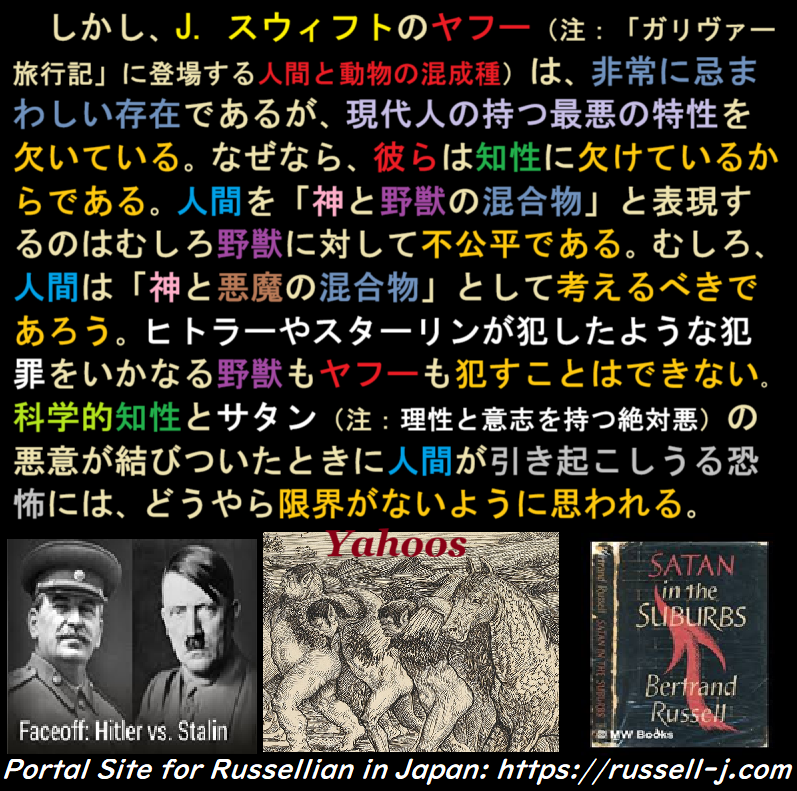
 ラッセル関係電子書籍一覧 |
しかし、J. スウィフトのヤフー(注:「ガリヴァー旅行記」に登場する人間と動物の混成種)は、非常に忌まわしい存在であるが、現代人の持つ最悪の特性を欠いている。なぜなら、彼らは知性に欠けているからである。人間を「神と野獣の混合物」と表現するのは、むしろ野獣に対して不公平である。むしろ、人間は「神と悪魔の混合物」として考えるべきであろう。ヒトラーやスターリンが犯したような犯罪を、いかなる野獣もヤフーも犯すことはできない。科学的知性とサタン(注:(理性と意志を持つ絶対悪)の悪意が結びついたときに人間が引き起こしうる恐怖には、どうやら限界がないように思われる。
But Swift's Yahoos, repulsive as they are, lack the worst qualities of modern man, since they lack his intelligence. To describe man as a mixture of god and beast is hardly fair to the beasts. He must rather be conceived as a mixture of god and devil. No beast and no Yahoo could commit the crimes committed by Hitler and Stalin. There seems no limit to the horrors that can be inflicted by a combination of scientific intelligence with the malevolence of Satan.
Source: Bertrand Russell: Human Society in Ethics and Politics, 1954, part II: The Conflict of Passions, chapter 10: Prologue or Epilogue? n3
More info.:https://russell-j.com/cool/47T-2_1003.htm
<寸言>
私が学生の頃、現代国語の大学入試問題の一つとして、「下線部の言葉は何を意味しているか(あるいは、何を指しているか)50字以内で答えよ」といった記述問題がしばしば出題されました。現在でもそうでしょうか? そういう場合、「下線部の言葉」は通常の意味で使われていない場合や意味は同じでもその言葉に含まれる例外的なニュアンスを強調して使われる場合がけっこうありました。
「本日のラッセルの言葉」のなかの「知性」という言葉もそうです。「知性」という言葉は「知識」という言葉と異なり、否定的なニュアンスで使われることはほとんどないですが、ここでは、「知性」の否定的なニュアンスに焦点があてられています。
ところで、引用文のなかに「devil」(悪魔)と「Satan」(「サタン」:先頭が大文字であることに注意!)という言葉がでてきますが、注記なしで正確に違いが理解できるでしょうか? 今回は同時に出てきているので、「Satan」を「サタン」と訳したうえで注をいれていますが、「Satan」だけ出てきた場合には「悪魔」と訳してしまいがちではないでしょうか? そのように訳したのでは、ラッセルが言おうとしていることをよく理解できません。大文字で始まっていることからわかるように、「理性と意志を持つ絶対悪としてのサタン」のことをここでは意味しています。宗教(ここではキリスト教)が関係していることはついつい見逃し勝ちなので要注意です。
When I was a student, one type of modern Japanese reading comprehension question that frequently appeared on university entrance exams was a written response prompt such as: “What does the underlined word mean (or what does it refer to)? Explain in 50 characters or fewer.” I wonder if such questions are still common today.
In those cases, the underlined word was often used in an unusual way, not in its standard sense, or with an emphasis on some exceptional nuance that is not typically highlighted.
The word “intelligence” in today’s quotation from Russell functions in just such a way. Unlike “knowledge,” the word “intelligence” is rarely used with a negative connotation. But here, Russell specifically focuses on a negative aspect of intelligence.
By the way, in the passage, we encounter both the words “devil” and “Satan” (note that “Satan” is capitalized!). Can readers really grasp the distinction between them without any explanatory note?
Since both terms appear together in this passage, I chose to translate “Satan” as 「サタン」 and add a footnote. However, if only “Satan” had appeared, wouldn’t it likely have been translated simply as 「悪魔」 in Japanese? But doing so would obscure what Russell is actually trying to say.
As indicated by the capital “S,” Russell is referring here to “Satan as the embodiment of absolute evil endowed with reason and will.”
Because Christianity is involved here, something we tend to overlook, it is important to pay careful attention to the context.